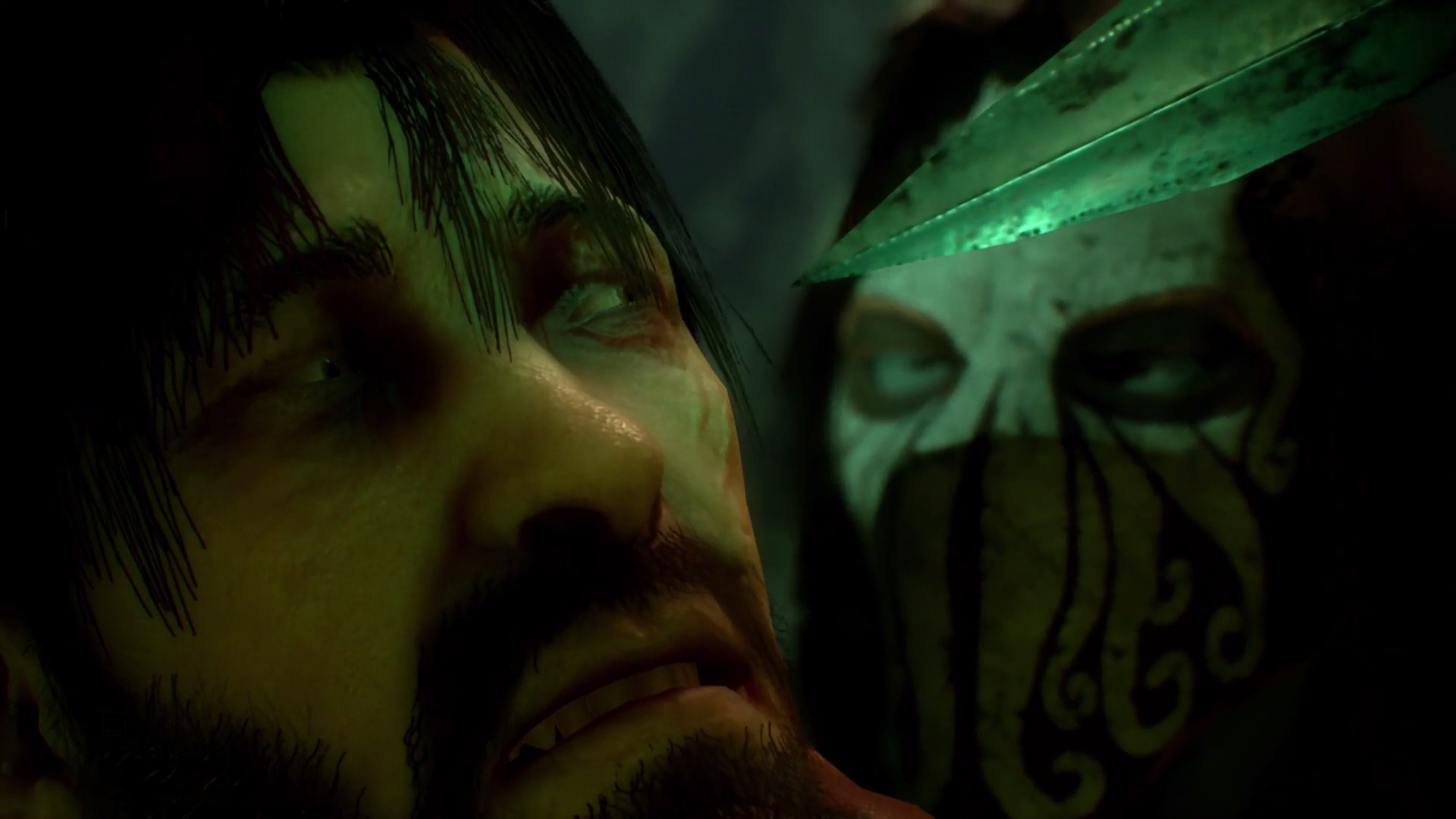Our Verdict
A mediocre detective game with predictable stealth and a surreal story that runs out of steam near the end.
PC Gamer's got your back
What is it? A Lovecraftian adventure game with a surreal story
Expect to pay: $45/£40
Developer: Cyanide Studio
Publisher: Focus Home Interactive
Reviewed on: Windows 10, i7-8750H, GTX 1070, 16GB RAM
Multiplayer: None
Link: Official site
As I walk down a seemingly endless corridor, spotlights popping into life as I approach them, I spy a shadow through the window of a white padded cell. I press my face to the glass and see myself staring back, and then, suddenly—and I’m still not sure what camera trick developer Cyanide used to pull this off—I’m the one inside the white room. As I turn to look around, the window and door vanish, and I writhe in panic, a green gas clawing at my vision as I scream. When a door finally appears, it leads not onto a long corridor but into a doctor’s room, where a man in a white coat leans over a mangled patient.
When Call of Cthulhu embraces just how bizarre its tale of cults, awakened old gods, and mental fragility is, it feels like a surreal horror triumph. But, sadly, that only happens for about five minutes at a time, and between those moments it’s an astoundingly average adventure game full of generic puzzles and predictable stealth segments.
Island shudders
It begins when famous painter Sarah Hawkins and her family die in a house fire on a remote island called Darkwater, near Boston. The police blame Sarah, claiming she was mentally unstable, but her father thinks otherwise. He can’t get anyone to listen to him, and as a last resort visits failing, alcoholic private detective Edward Pierce—that’s you. You’re asked to jump on a boat, dig around the Hawkins’ burned-out mansion, and find out what really happened.
Darkwater is an unsettling place, and I feel its oppressive atmosphere as soon as I step ashore. Fishermen glance at me over glasses of moonshine, while down at the docks a crowd gathers around a marooned whale, its skin slashed as if by giant claws. And if the fact this is a Lovecraft-inspired game isn’t a big enough hint that this rundown town hides a dark secret, the early dialogue with the owner of a bar, a ship captain, and the leader of a bootlegger gang leaves me in no doubt.
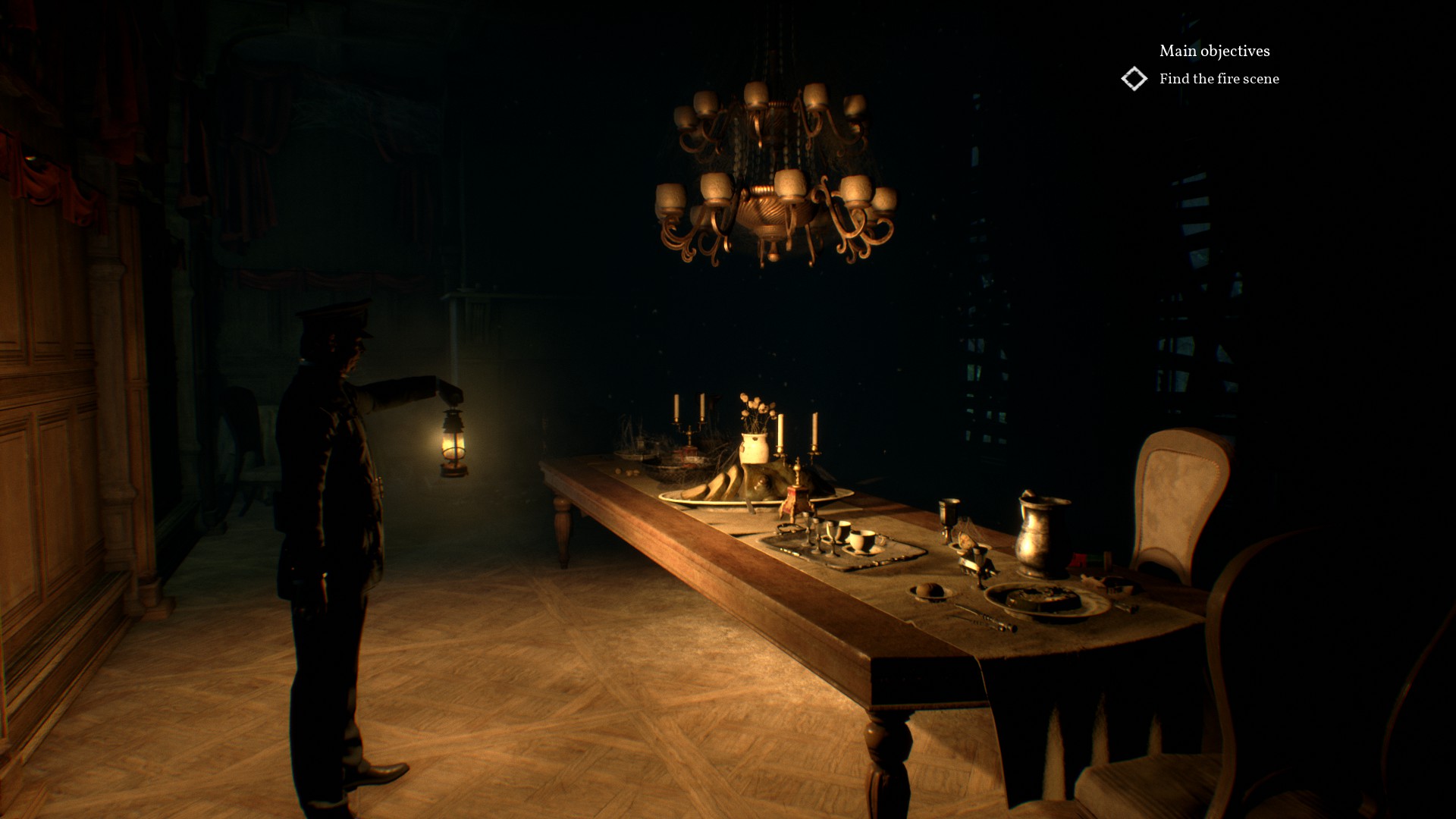
To find clues, I just walk around searching for glowing dots, pressing E on them to examine whatever book, photograph or blood stain I’ve come across.
But as I soon find when I head to the crime scene, the detective work involved in uncovering that dark secret is puddle shallow. To find clues, I just walk around searching for glowing dots, pressing E on them to examine whatever book, photograph or blood stain I’ve come across. Sometimes, the game will tell me there’s a hidden object nearby—but all that means is the glowing dot is tucked beneath a desk, and it’s green instead of white.
You can also reconstruct the past in certain situations, activating clues one by one to build up a silhouetted version of events. These made me feel more like a detective, and the scenes are detailed enough that I could sometimes guess what happened before Pierce worked it out, which is satisfying. In one, I was shown a young woman eavesdropping on a conversation between three seated men. It looked, to me, like whoever had been sitting in the farthest away chair would’ve seen her. Sure enough, when I walked to that chair, it triggered an image of a man rising to confront the woman, and I felt very clever indeed.
Those moments of deduction were rare, however, and most of the clues feel like window dressing for whatever room you’re in, rather than part of the story. A lot of the time I just felt like I was clicking on dots until I could trigger the next cutscene.
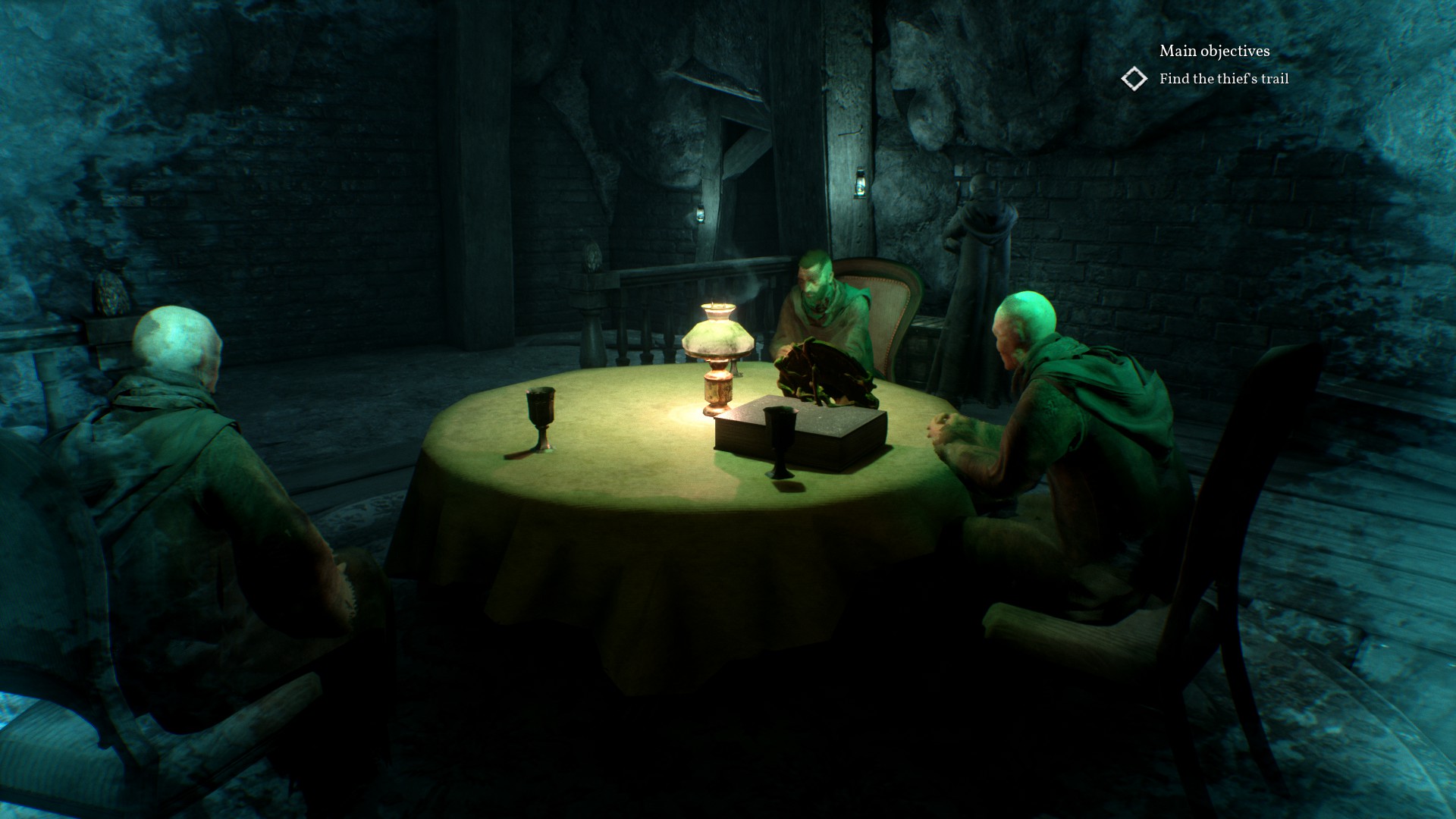
No brains, no brawn
The puzzles are generally boring too, and some repeat: on three separate occasions, you have to follow the trail of a pipe or cable between rooms to find the source of electricity, water, or gas. In another puzzle, in an old bookshop, you’re asked to work out the combination of a safe from a series of audio logs. You’re told it’ll take a "genius" to solve it, but you’re spoon-fed the answers, and I cracked the safe in less than a minute.
Stealth sections are sandwiched awkwardly between these puzzles. As you sneak about an asylum, guards walk the same paths on loop and if you create a distraction—by convincing a patient to scream, for example—they’ll come to inspect and never return to their post, staring at the same spot endlessly.
You’ll also face one Lovecraftian beast multiple times, and each encounter is frustrating. You can never fight back, which means you’re always running away and hiding (there’s only one combat sequence in the entire game and it’s a pointless shooting gallery against zombie-style enemies late on). The first time you meet the monster, you have to avoid it so you can destroy a painting. Destroying it requires an unspecified item in a room full of objects that look the same, so it’s basically trial and error. If you pick the wrong one, you might have time to pick up another before the monster catches you, but most of the time it’ll find and insta-kill you, restarting the whole sequence.
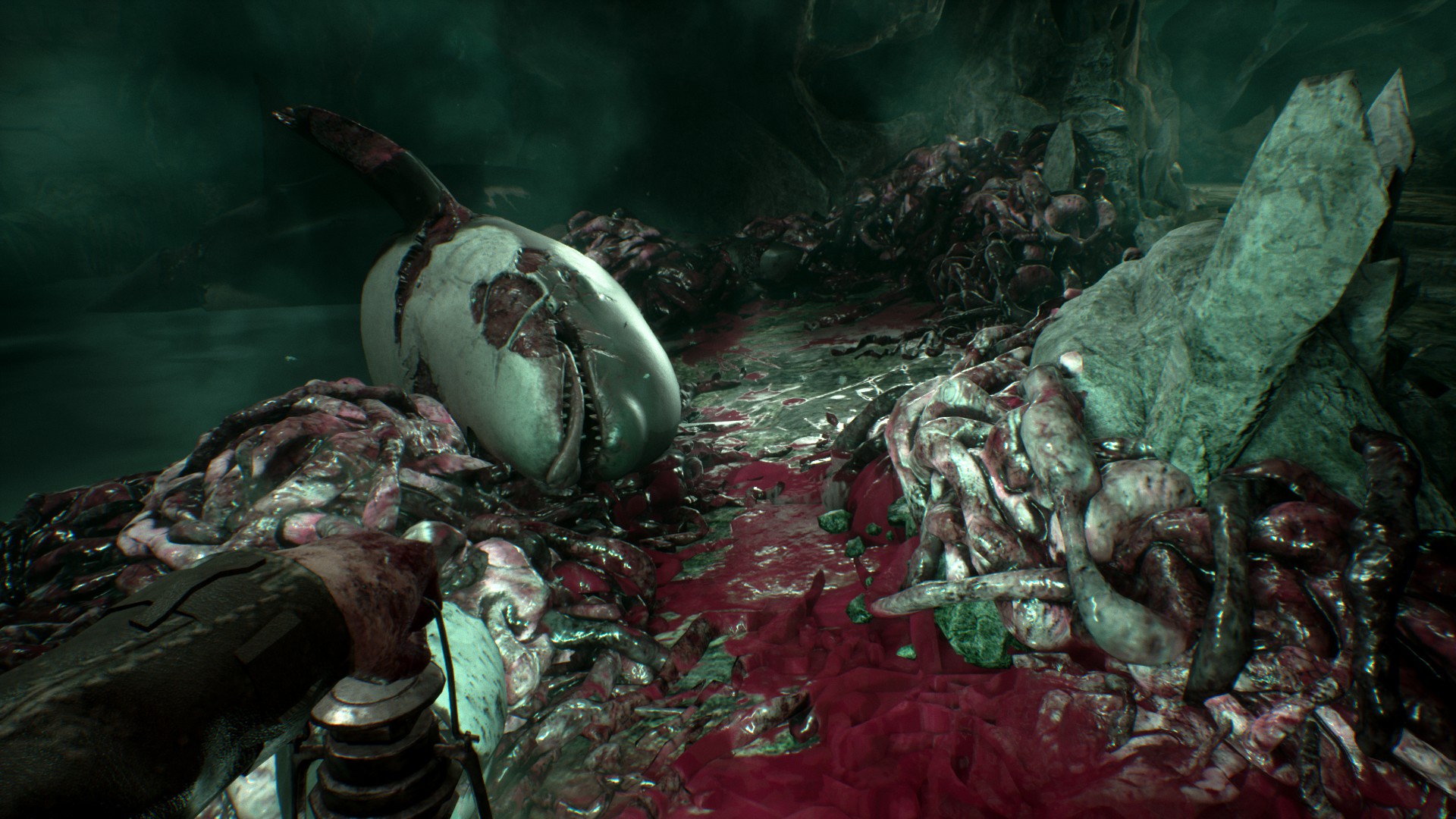
The mountains of madness
The story is really the only thing that provided any fun—for the first two-thirds, it had its tentacles around me. The narrative unfolds slowly at first, as Pierce realises just how deep the mystery goes and then, gradually, it begins pulling him into different dimensions. You’ll delve into a nightmare dungeon beneath the Hawkins manor full of torture and violence, and then you’ll wake up on a sofa in the drawing room, unsure whether it was real or not. Pierce is a dull protagonist, but he’s just as bewildered as you are, which made me feel some connection to him, and help understand his descent into madness.
When the action matches how ambiguous the story is, it’s hard to put down. In its best puzzle, you switch between two lamps to travel between different versions of a hospital, opening up doors and revealing runes as you go. It’s dark and confusing and you’ll go through doors that warp you back to the start. Surreal sections like this stand out, and it’s a shame there aren’t more of them.
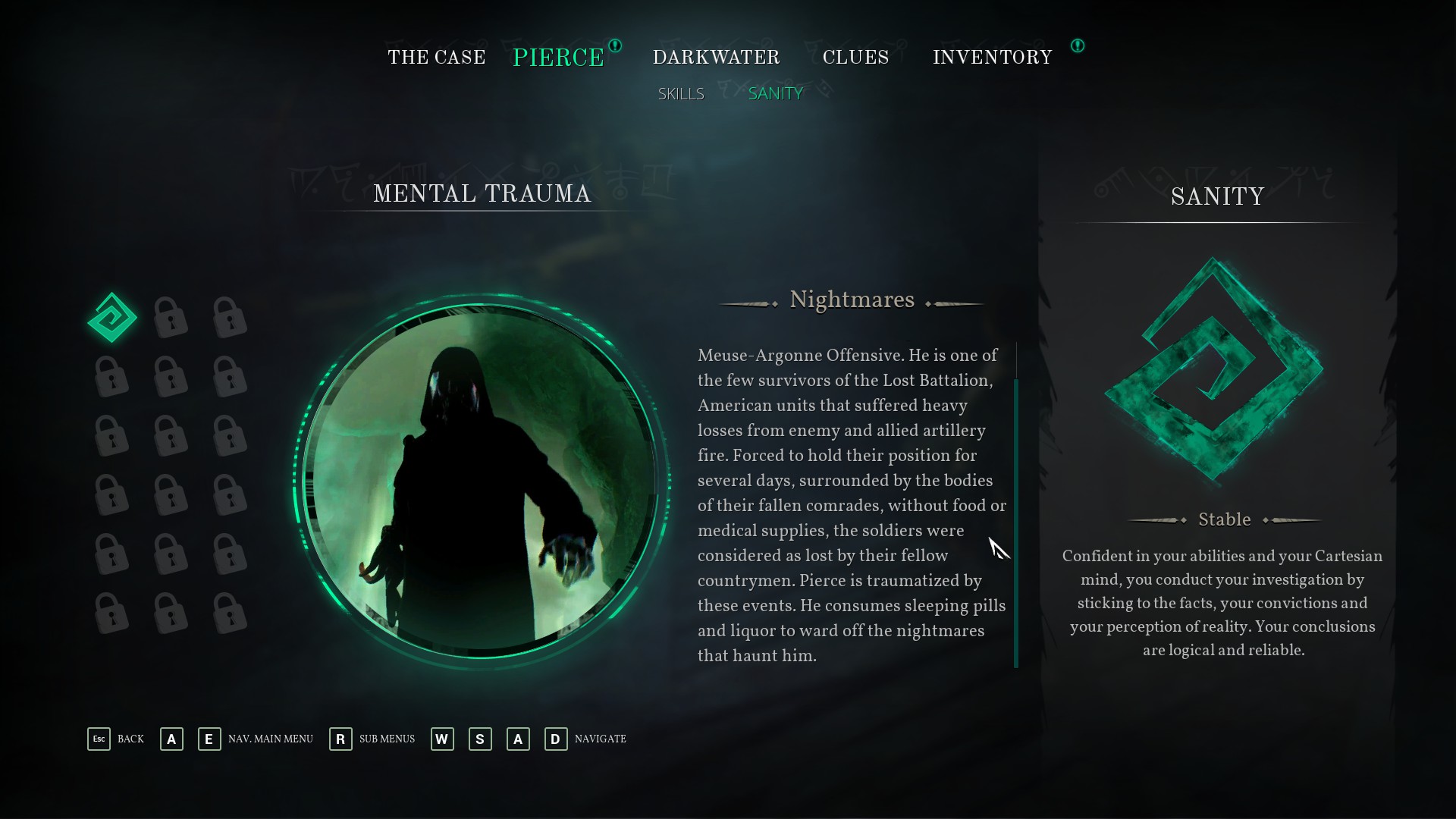
In the final third, the ambiguity gets overwhelming, and the murder mystery is tossed aside hurriedly, leaving plot threads dangling.
You can steer the story by making occasional decisions that are in part governed by an RPG-like stat system. Call of Cthulhu is based on the tabletop RPG of the same name, which means you get character points to spend on different attributes as you progress. In dialogue, you’ll get access to different responses based on your stats. You might be able to threaten somebody if your strength is high, or blag your way out of a tight spot if you’ve invested in eloquence. Some doors will be locked behind a certain investigation skill, while a high psychology stat will give you insight into the behaviour of others.
Having lots of points in a certain skill doesn’t guarantee success, however, and Call of Cthulhu never explains how your stats translate into actions. You know there are dice rolls going on behind the scenes when you try to pick a lock, and sometimes you’ll be able to guess how decisions you make affect the story, but in general it’s hard to figure out, and that fits the eerie, unknowable setting. When you make certain choices, the game will tell you they "affect your destiny", but never explains how—again, I’m a fan, as it keeps you guessing.
But in the final third, the ambiguity becomes overwhelming, and the murder mystery is tossed aside hurriedly, leaving plot threads dangling. The idea is that you’ll instead focus on the Lovecraftian cosmic horror, but it throws far too much at you at once. Late in the game, it introduces new concepts at the same time as the motivations of existing characters change, and I felt lost—like I no longer had a stake in the story, and like the questions I had about my journey so far would never be answered.
Throughout Call of Cthulhu’s eight hours it threw up enough mysteries that I still wanted to see what happened at the end—I just no longer cared when I was presented with the game’s final big decision. I enjoyed its surreal moments, and one of the four possible endings is a real spectacle, but even it isn’t worth slogging through the detective busywork.
A mediocre detective game with predictable stealth and a surreal story that runs out of steam near the end.
Samuel Horti is a long-time freelance writer for PC Gamer based in the UK, who loves RPGs and making long lists of games he'll never have time to play.
